
OFFICIAL TRADE JOURNAL OF THE MICHIGAN CANNABIS INDUSTRY ASSOCIATION



OFFICIAL TRADE JOURNAL OF THE MICHIGAN CANNABIS INDUSTRY ASSOCIATION

Stash Ventures expands after acquiring Cloud Cannabis













Greg and the entire SSG Team have been a tremendous help in the implementation and administration of our employee benefits program across our multiple locations. Their expertise and knowledge in the industry has provided exceptional value in helping us make informed decisions regarding coverage and cost, technology, and ACA compliance I highly recommend SSG and look forward to a continuing relationship.













SSG is a fantastic company to work with in regard to benefit administration and all the tedious leg work that goes into it. They certainly make it easy for you as the employer and take the time and efforts to get to know your business from a personal, professional, yet compassionate angle to ensure that your staff and company are getting the best plans and rates available.
Shout out to the SSG team for always being there for our needs - you won't get better service anywhere else!


 GREG SUDDERTH CEO & Lead Benefits Advisor
GREG SUDDERTH CEO & Lead Benefits Advisor
























































































































































































Your Growing Business Every Step of the Way


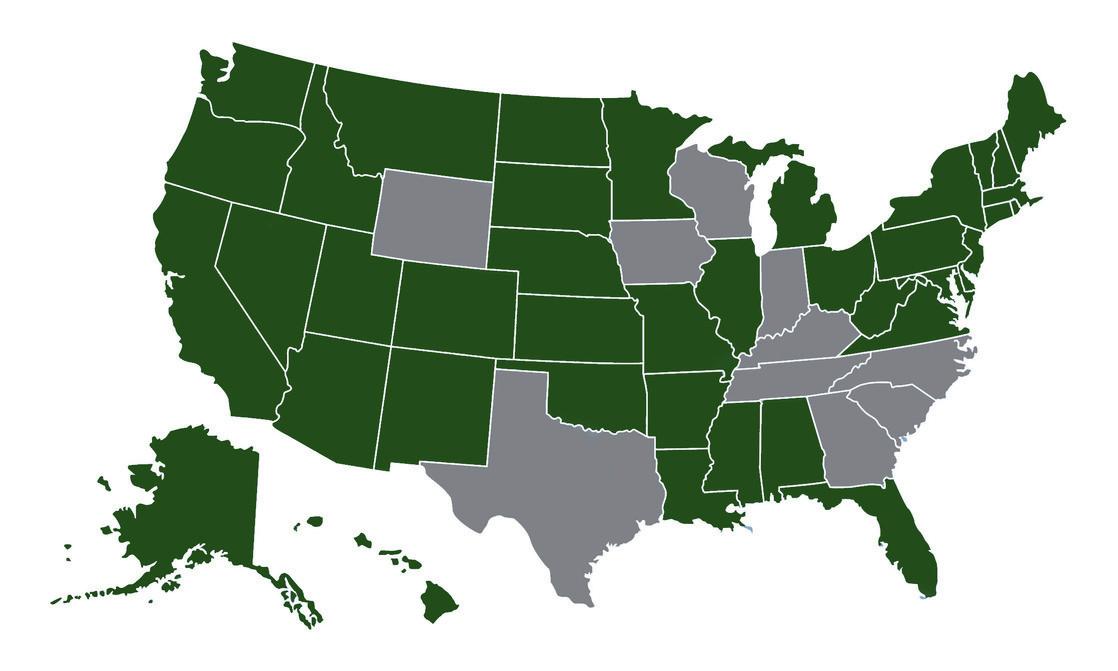















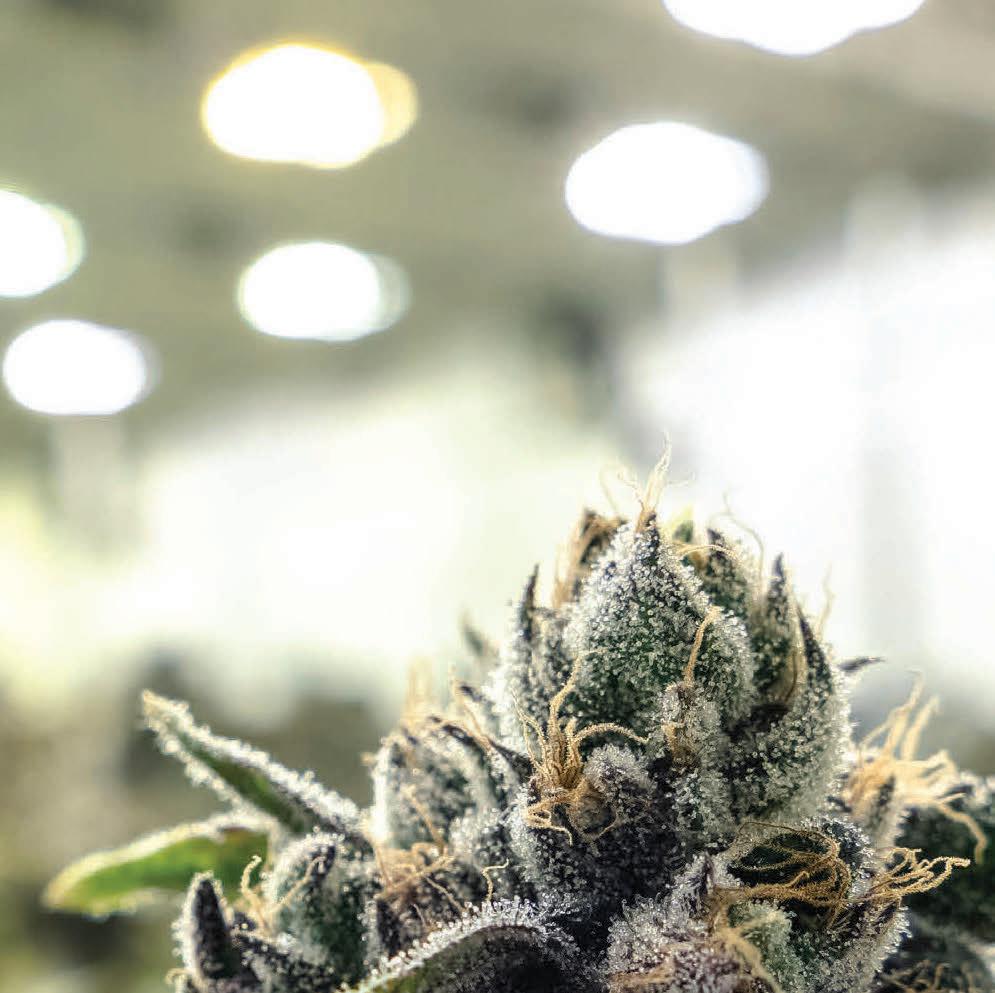




We focus on the kind of growth that doesn’t come from a seed.
Focused on your next move. Cannabis. It’s complicated. It’s capital intense. And it’s highly regulated. To focus on growing your company, you need a financial partner who understands state requirements, compliance issues and the unique landscape of the industry. As longtime members of the MiCIA, Maner Costerisan’s team of experts helps dispensaries, processors, secure transporters and cultivators across the state achieve their goals.
We assist cannabis companies managing the complexities of running multiple entities and provide CFO-level expertise to those looking to develop or execute buy-sell strategies. Our tech experts integrate cloud-based accounting financial software with your current systems –including seed-to-sale software — providing you with a new level of customized, real-time data, so you can make more informed business decisions. We know how to turn America’s new cash crop into a long-term plan.


Talk To An Expert:
14 COVER STORY
BRANCHING OUT
Stash Ventures expands after acquiring Cloud Cannabis
By Wensdy Von Buskirk20 FUNDING FOUNDERS
Homegrown Detroit program gives out $100,000 in grants to 24 Detroit Legacy entrepreneurs By Paris
Giles24 CITY CULTIVATOR
Uncle J’s Joints is thriving in Detroit and planning to expand By
Kathy Gibbons10 LETTER FROM EXECUTIVE DIRECTOR By
Robin Schneider12 LEGISLATIVE UPDATE By Kevin
A. McKinney,MiCIA lobbyist
29 HIGHLIGHT
Compliance manager talks about the importance and challenges of following the state’s rules
By Emily Doran32 SCIENTIFIC COMMITTEE
Why terpene testing matters in medical cannabis By
Cathleen S. Graham,registered nurse
35 CANNABUSINESS
Michigan cannabis licensees are facing financial challenges. Here’s what’s next.
By Patrick Dunn38 TRENDING NOW
Michigan’s cannabis businesses may soon find it easier to offer inventive, multi-strain products
By Lauren Wethington48 SAVE THE DATE
The MiCIA’s sixth Summer Annual Conference and Chronic Cup Championship is Aug. 7 to 9
In the previous issue of MiCIA Magazine, in the article about The Hive at BDT, we incorrectly wrote that The Hive’s infused flower is coated in distillate. We also incorrectly shared that The Hive would eventually be able to send its own flower, grown in-house, to external processors for infusion.
The Hive’s flower is only infused with solventless rosin or kief and live resin. In addition, The Hive’s license type does not allow for the microbusiness to send out its own in-house flower to external processors for infusion. We sincerely apologize for the errors, which we have corrected in the digital version of the magazine.
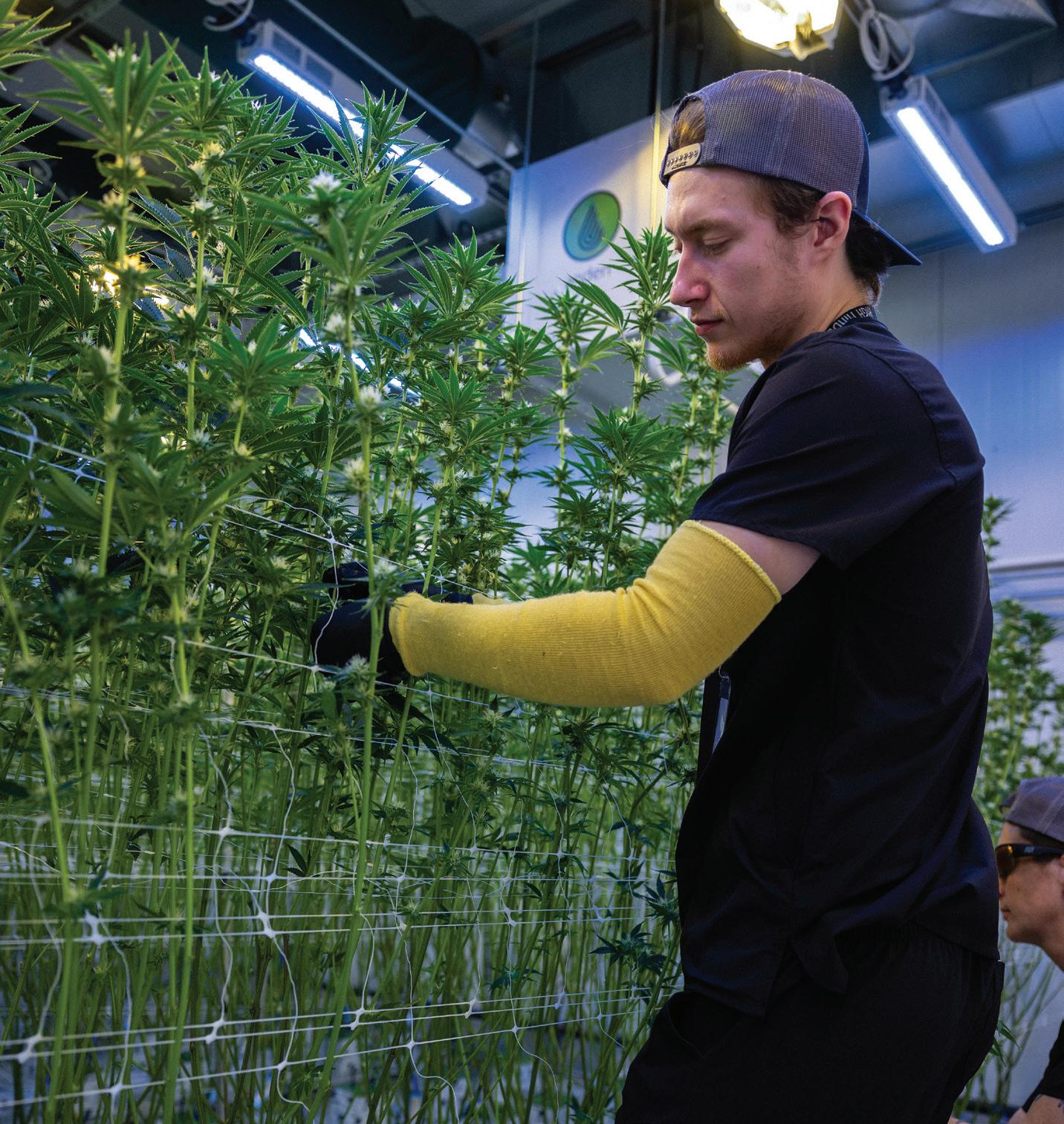



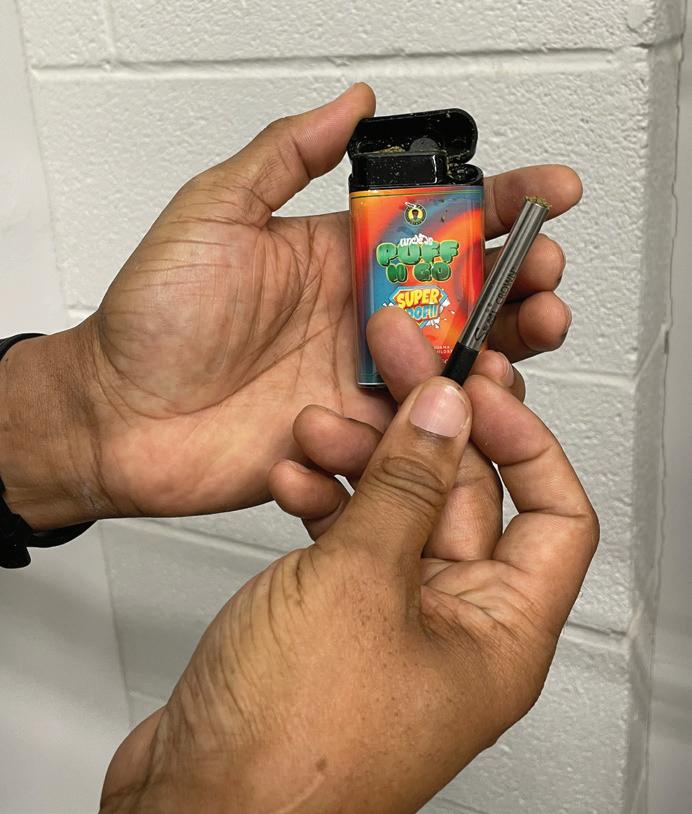












Ia spotlight on the intrepid entrepreneurs who power the world of Michigan cannabis. Starting a business isn’t for the faint of heart, particularly in an industry as young and unpredictable as ours. We are proud to stand alongside and advocate for these pioneers as they work to create a safe, fair, inclusive, and prosperous industry.
One way we help business owners (and aspiring business owners) is through the Homegrown Detroit program administered by the city of Detroit’s Office of Marijuana Ventures & Entrepreneurship. We have been honored to serve as the nonprofit fiduciary for the donation-fueled Homegrown fund. Through the fund, Detroit has awarded $100,000 to social equity license holders and pre-qualified applicants. If you attended our holiday gala this past December, then you saw the city’s own Kim James announce — and award grants to — some of the deserving recipients. You can read more about them on page 20.
MICHIGAN CANNABIS INDUSTRY ASSOCIATION
101 S. Washington Square, Ste. 820 Lansing, MI 48933 micia.org
you are interested in hosting lawmakers at your
tors are great ways to promote our industry. If you are interested in hosting lawmakers at your place of business, email us at info@micia.org and we can help you coordinate that.
For our cover story, we dive into some big news from earlier this year: Stash Ventures’ acquisition of Cloud Cannabis. This deal has been particularly noteworthy given that we’ve seen fewer company sales in our industry than some experts have anticipated. We’ll see how this sets the tone for other sales down the road. In the meantime, you can read more about the team that has been working to integrate Cloud into Stash’s portfolio of companies on page 14.

Schneider
We also interviewed Jason Wilson from Uncle J’s Joints (page 24), a top-notch grower in Detroit. Jason is the perfect example of an engaged industry member. He acts as a mentor to others, and he also coordinated with us to host a group of legislators for a tour at his facility. Supporting other entrepreneurs and making the effort to connect with and educate legisla-
ANDREW DRIVER
CHAIR
Driven Grow
MARK PASSERINI
VICE CHAIR Om of Medicine
DAVE KRAMER
TREASURER
Driven Grow
RAYMOND ABRO JARS Cannabis
Finally, we explore a couple of other hot-button issues affecting all licensees: compliance and the financial state of the industry. We interviewed Liz Ridgeway (page 29), the facilities compliance manager at Green Stem Provisioning in Niles, to learn more about her role and the rules she’d like to see change. We also spoke with a lawyer and a few CPAs to get their takes on the financial challenges facing licensees right now, including nonpayment issues and falling prices (page 35). Times have been tough, but we are looking forward to better days ahead!
FOLLOW US AND LIKE US
MiCIA STAFF
ROBIN SCHNEIDER Executive Director robin@micia.org
KENZIE TERPSTRA Membership Coordinator kenzie@micia.org
MICHAEL J. PATTWELL Corporation Legal Counsel mpattwell@clarkhill.com
KEVIN A. MCKINNEY Lobbyist kevin@mckinneyandassociates.net For membership inquiries, email info@micia.org PUBLISHING PARTNER
Robin Schneider, Executive DirectorJEVIN WEYENBERG
Lake Effect
SAM USMAN PG Group
ALEX ADAMS
Cambium Analytica
CALVIN JOHNSON Primitiv
JERRY MILLEN
The Greenhouse of Walled Lake
NICK AGRO High Level Health
GEORGE LYNCH Green Stem and Simplicity Farms
MIKE DILAURA House of Dank
BOB LANDAAL
Total Health Collective
SHORAN R. WILLIAMS Tend.Harvest.Cultivate.
GENERAL MANAGER Ed Peabody
MANAGING EDITOR Emily Doran
COPY EDITOR Olivia Sedlacek
ART DIRECTOR Mike Wagester
PRODUCTION DIRECTOR
Jenine Knox
SENIOR PRODUCTION ARTIST
Stephanie Daniel
ADVERTISING ACCOUNT EXECUTIVES
Cynthia Barnhart, Karli Brown, Donna Kassab, Mary Pantely
ADVERTISING COORDINATOR Jonathan Boedecker
CONTRIBUTORS
Joe Becker, Patrick Dunn, Kathy Gibbons, Paris Giles, Cathleen S. Graham, Kevin A. McKinney, Wensdy Von Buskirk, Lauren Wethington
MiCIA Magazine is published exclusively for the Michigan Cannabis Industry Association by Hour Custom Publishing, a division of Hour Media, LLC. Copyright © 2024. All rights reserved. No portion may be copied or published without the express written consent of the publisher. The views expressed in this publication are not necessarily those of the MiCIA or Hour Media.




» WORKPLACE VIOLENCE TRAINING
» ERGONOMICS ASSESSMENTS FOR WORKSTATIONS TO PREVENT REPETITIVE MOTION INJURIES
» ORIENTATION TRAINING DEVELOPMENT: INCLUDES SAFETY POLICY, RULES, HAZARDS, AND PROCEDURES FOR RESPONDING TO EMERGENCIES
» OSHA REQUIREMENTS AND REPORTING
» REVIEW OF SAFETY DATA SHEETS FOR CHEMICAL HAZARDS, APPROPRIATE CONTROLS AND EMERGENCY PROCEDURES
» RESPIRATORY PROTECTION AND PPE PROGRAMS AND ASSESSMENTS
» LOCK OUT, TAG OUT PROGRAM
» EYE PROTECTION, HEARING PROTECTION, ALLERGENS, WORKING WITH SHARP TOOLS, ETC.
» FORKLIFT TRAINING
» DEVELOPMENT OF EMERGENCY ACTION
» SITE RISK ASSESSMENTS FOR BIOLOGICAL, CHEMICAL, AND PHYSICAL HAZARDS
» MOLD, INDOOR AIR QUALITY, PESTICIDES, COMPRESSED GASES, ETC.
» DRIVER SAFETY AND TRAINING
» LEGALLY REVIEWED HUMAN RESOURCE PLATFORM
 By Kevin A. McKinney
By Kevin A. McKinney
he Michigan House has seen little substantive action since it went sine die in mid-November of last year. While the new calendar year reconvened the 102nd Legislature for its second year, there was not much activity given the 54/54 majority split that resulted from two House Democrats’ winning local elections. Sharp partisan divide prevented the governing House Democratic majority from moving issues forward since they did not have enough votes to pass most legislation. They would not agree to a shared power agreement, so, over the first four months while the House awaited results from the special elections in House Districts 13 and 25, there were few House session days, committee meetings were sparse, and little policy advanced through the lower chamber.
Now, after winning the two special elections in April, the House Democratic caucus has regained its working 56-member majority and has started to “catch up” on priority issues. The state budget for fiscal year 202425 is the top priority to complete prior to the anticipated adjournment for the summer at the end of June.
Despite a slow legislative process in the House, the MiCIA has remained engaged in several issues that will need legislative attention. Senate Bill 807, which would allow for 19-year-olds to work in adult-use licensed establishments, was introduced by state Sen. Sean McCann, D-Kalamazoo. This legislation will take the place of (former state Rep.) Mayor Kevin Coleman’s legislative effort, House Bill 4322, which sits on the House floor; as an “orphaned bill,” HB 4322 has fewer chances of moving. We are currently coordinating our advocacy efforts with Sen. McCann, hoping for a hearing in the Senate Regulatory Affairs Committee soon.
The legislative drafting of the merger of the Michigan Regulation and Taxation of Marihuana Act and the Medical Marihuana Facilities Licensing Act remains ongoing, but the draft is closer to a final position to share
with other stakeholders prior to introduction. This currently is a bipartisan/bi-chamber effort that will impact the strategies on the timing of introduction and committee work. However, the intent is to get this merger bill introduced prior to the summer break or, at the latest, early in the fall.
Legislation that would have the Cannabis Regulatory Agency pause the issuance of new licenses and place new restrictions/ guidelines on new retail licenses is still in the early drafting stages. The MiCIA is awaiting a new draft from the Legislative Services Bureau prior to convening a small work group with the House and Senate. The goal is to have this legislative initiative introduced later this year; realistically, there will not be adequate time to pass the legislation this session, but it will be ready for reintroduction in early 2025.
The other significant legislative initiative will be to address the flood of hemp products that have THC that exceeds the hemp
 Kevin A. McKinney
Kevin A. McKinney
threshold. This problem has also spurred the need for additional clarifying changes in the hemp industry in Michigan. A sponsor has been identified, and we are coordinating this endeavor with both the CRA and legislative leadership.
Finally, there seems to be an overall interest in the Senate to hold a committee hearing focused on the current state of the cannabis industry in Michigan. The MiCIA has encouraged this open discussion to better educate lawmakers on the current challenges and opportunities in the industry. A timetable has not been determined by the Senate Regulatory Affairs Committee chair for the public hearing, but the MiCIA will continue to support this endeavor.
We continue to be informed by the CRA that the proposed administrative rule set will be ready for public viewing and comment later this summer or early fall. This will include a public hearing with ample opportunities to provide comments and recommendations.
The Michigan House is up for reelection this year, while the Michigan Senate is not up until 2026. It will be critical to engage at the state level and support the candidate(s) running that best align(s) with your interests.
The MiCIA has sent out a survey to all the primary candidates running for the Michigan House, U.S. congressional seats, and the U.S Senate. The goal is to have their responses evaluated and shared on the MiCIA website so you, your employees, and your advocates will have a better understanding of the candidates’ positions on cannabis at the state level as well as the recent developments at the federal level.
It is a pivotal time for cannabis in both the political arena and the eyes of the public. Your active involvement in advocacy and supporting your association’s political action committee will be impactful to your cause.
KevinA.McKinneyistheleadlobbyistfor the MiCIA.
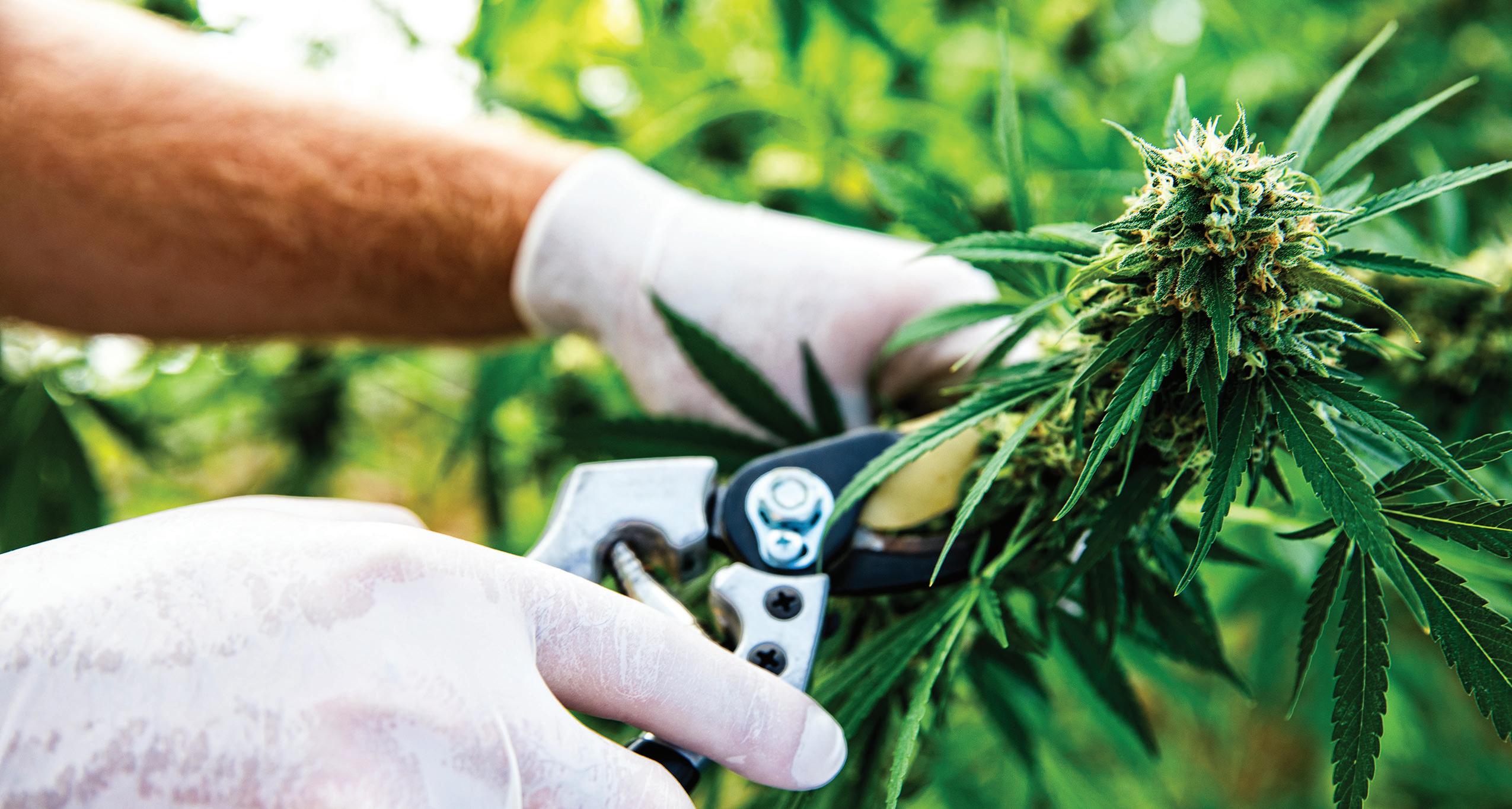
At Conifer Insurance Services, we know every cannabis business is unique. That’s why we have designed our insurance program to provide business owners with a variety of flexible and robust coverage options. From dispensaries and cultivators to product manufacturers, microbusinesses and beyond, our comprehensive coverage is available to businesses operating within legalized states and D.C.


Stash Ventures expands after acquiring Cloud Cannabis




It’s been a big year for Stash Ventures.
In January, the parent company of Timber Cannabis Co., High Minded, and High Minded Creations announced its acquisition of all Cloud Cannabis retail locations throughout Michigan.


Cloud Cannabis in Traverse City



Corporate HQ
Mount Pleasant
Doing Business as Timber Cannabis Co. — Retail
Mount Pleasant, Sturgis, Three Rivers, Allegan, Big Rapids, Muskegon
DBA Cloud Cannabis — Retail
Ann Arbor, Utica, Detroit, New Baltimore, Kalamazoo, Grand Rapids (2), Cedar Springs, Muskegon, Traverse City, Gaylord
DBA High Minded Harvest — Cultivation
Mount Pleasant, Owosso, Sturgis
DBA High Minded Creations — Processing
Mount Pleasant
The move marked a major expansion for the company and signaled what could be the leading edge of more mergers and acquisitions as Michigan’s crowded market shakes out. Before the purchase, the vertically integrated entity had operated six Timber retail locations. The deal, whose dollar figure is undisclosed, brought 11 Cloud locations under the Stash Ventures umbrella, plus licensing for five more, giving the company more outlets to sell the wide range of products it grows and manufactures.
“We have enough product and flower to supply more shelf space,” says Katie Wiley, Stash Ventures’ chief legal and strategy officer. “We do retail really well, so we decided to pick up their retail arms.”

As part of the terms, the former owners of Cloud Cannabis kept their cultivation and processing operations. Stash Ventures plans to preserve the popular Cloud brand in addition to High Minded and High Minded Creations, the company’s cultivation and processing arms, respectively.
“It’s absolutely exciting,” says Wiley, who anticipates “a bit more consolidation to come in the Michigan market. … Doing what we do well makes the industry stronger, and having other people do what they do well, we’re thrilled to see it.”
Stash Ventures was founded by Indianabased couple Scott and Julie Moorehead. With the plant still illegal in their home state, they sought to invest in the Midwest and chose Michigan. They opened their first dispensary in 2020, capturing an outdoorsy aesthetic that has carried through all their Timber locations. I got to experience the vibe firsthand on a recent spring visit to the company’s headquarters in Mount Pleasant. The compound houses an example of each component of Stash Ventures’ vertical integration on-site, from cultivation and processing to retail.
The first thing I see turning into the parking lot off Pickard Street is the Timber sign, with the “T” in its logo notched like a tree trunk about to fall. Inside, I am greeted
 by
by
Alex McCoy, assistant general manager of the dispensary, who uses their walkietalkie to alert the team that I am here for a tour. The company’s other retail locations are in Sturgis, Three Rivers, Allegan, Big Rapids, and Muskegon, and Timber leans into an “Up North” feel with cozy furniture, warm earth tones, hewn-log wallpaper, and knotty wood paneling.
Matt Roman, director of government relations, meets me in the lobby and leads me across the back lot toward the 45,000-square-foot cultivation and processing facility. I can smell the plants as we approach.
“We call this ‘The Mothership,’” Roman says.


As we walk through the staff break room, the first thing I see is a poster showing the company’s “Five Promises”: to be authentic, connect, care, inspire, and drive the business.
“It’s our ethos here,” Roman says. “It’s embedded in our culture.”
To enter the grow area, I must undergo the company’s biohazard protocols, designed to protect the plants from pests and pathogens. I step into a contraption that applies paper shoe covers one foot at a time, and snap into a gray smock with gathered sleeves.
Daniel Johnson, director of cultivation,
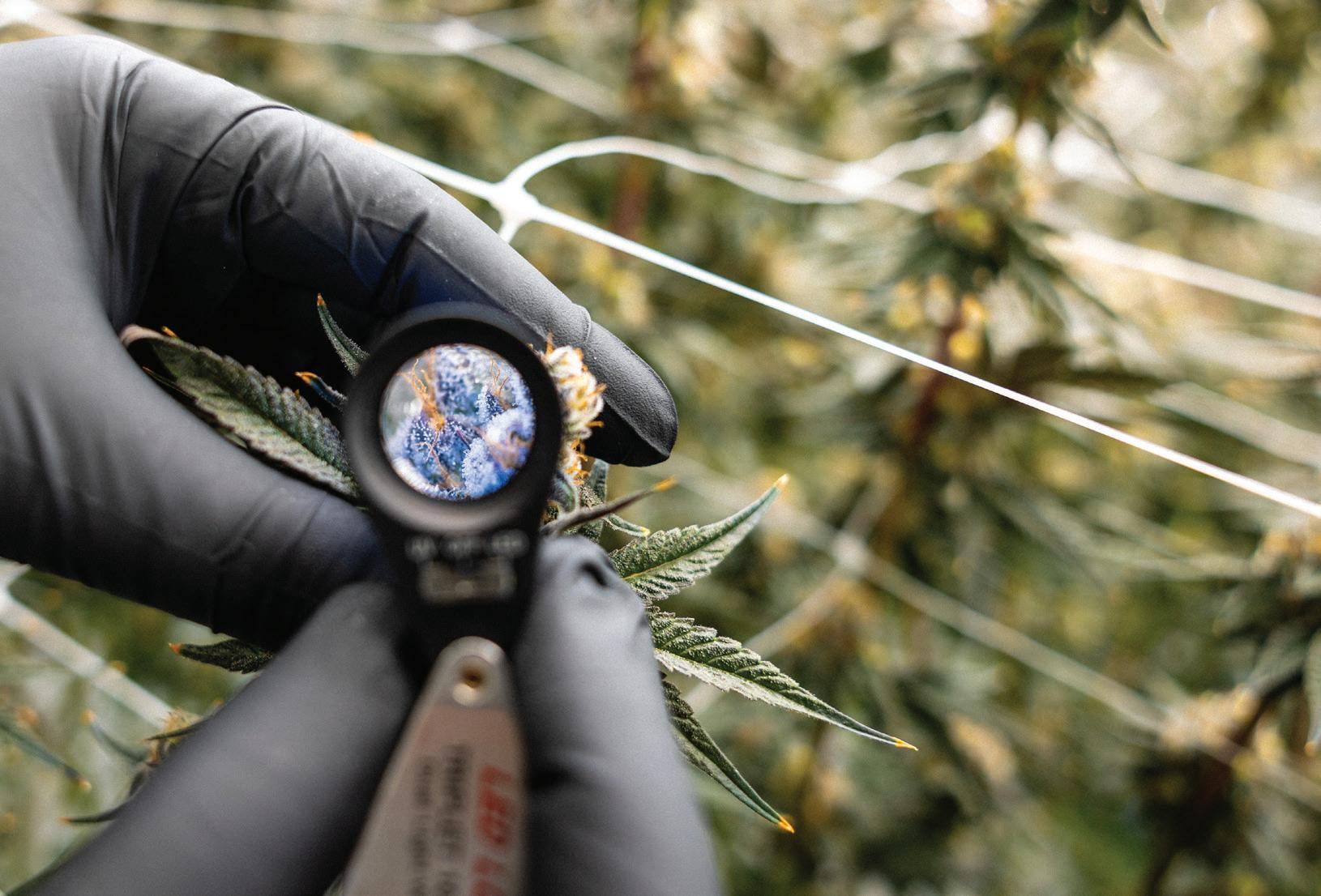
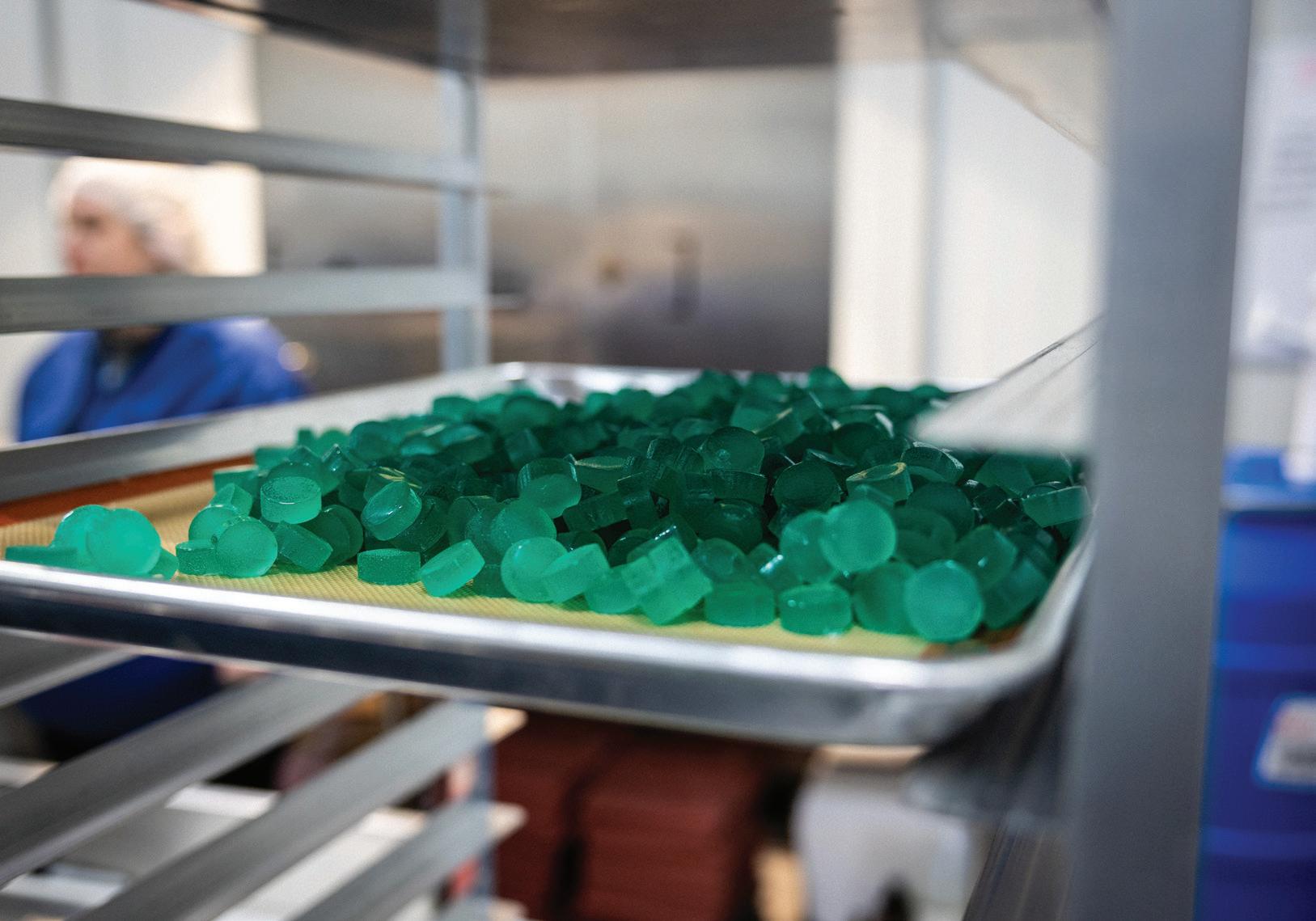
takes the lead showing me the water treatment room, where some 3,200 gallons are processed with the ability to recycle and feed the plants each day, and the fertigation room, where Rhythm System controls the nutrients added to various holding tanks. Johnson explains that he can monitor and control the system from his phone.
Around a corner, we come upon a long ramp bathed in an ethereal green light that evokes the building’s “Mothership” nickname. At its end glows a Rhythm panel, a touchscreen monitor that displays information from sensors embedded in the facility’s eight flower rooms, where 4,320 plants of 16 to 20 strains grow at any given time. Combined with the company’s cultivation
facility in Owosso and another in Sturgis coming online just a few weeks after my visit, they grow a total of 32,000 plants.
Johnson lets me step into several flower rooms, each one hospital clean, where plants nestle in spiky Air-Pots arranged in perfect rows, tubes snaking into their Rockwool. Each cultivar, from Permanent Marker, Cadillac Rainbows, and Superboof to Lemon Cherry Gelato and Sour Sunset Sherbet, has its own unique color, character, and smell.
“This one will blow your mind,” Johnson says as he opens the door to Cap Junky, its thick colas poking through lattice net, its buds and leaves frosted with trichomes, its stalks “praying” in a healthy
outstretched position.
“We’ll probably get 130 to 150 pounds out of this room,” he says. “To get these types of yields, it’s all monitoring, and technology makes it easy to make adjustments to the environmentals and feed to make this the best in Michigan.”
Stash harvests anywhere from 360 to 720 plants here every Monday, and the flower is processed for various purposes. That’s where Director of Production Zachary Shepp comes in.
The next part of the tour takes me through the processing facility. After the plants are cut, they hang upside down on metal racks in the dry rooms. Then they are trimmed, first roughly by machine and then by hand for the finishing touches. Shepp shows me “The Vault,” where cure tubes lie on shelves, their lids equipped with sensors to ensure the right humidity.
“‘Jealousy’ is drying right now,” Shepp says. “We’re getting the flavors and terps to come out.”
From there, the flower is graded, with the best buds fetching top dollar. The new cultivation facility in Sturgis will produce strictly high-end, hand-trimmed “grower’s reserve,” but here, Stash produces flower for every price point and purpose. None of it goes to waste. Some buds are flash frozen to preserve their flavor and potency for extracts. Shake is turned into pre-rolls. Biomass goes through hydrocarbon extraction to be processed into crude oil that is then used for various products made on-site.
In the industrial kitchen, I glimpse teammembers in various stages of making gummies as Johnny Cash plays in the background. In another room, I watch an employee injecting vape cartridges to a soundtrack of rap.
The Mooreheads have spared no expense in equipping Stash Ventures with the latest technology, including state-of-the-art machines that accurately weigh and seal flower in various packaging.
Through the Higher Hopes Foundation, they also support causes that are personal to their employees. Shepp shows me a High Minded Crush O.G. bag emblazoned with pink boxing gloves; proceeds from that strain have benefited people undergoing cancer treatment. There’s also a DD420 bag with a camo print whose proceeds benefit veterans.
“That’s what’s really cool about Scott,” Roman pipes in. “From the beginning, he’s always been very focused on giving back to the community.”
With the acquisition of Cloud, Stash Ventures now has around 400 employees, and that number is expected to grow to about 450 by the end of this year.
“We tripled the size of our business in one day,” Wiley says. “Scott and Julie dove in and talked to all the employees to see what worked and what needed to change. We didn’t make a lot of changes. We wanted them to feel safe and do what they do best.”

According to Joe Becker, director of marketing for Stash Ventures, the company plans to streamline its branding as it continues to transition.
If Timber is a laid-back rural retreat, Cloud is its cool urban cousin.
The Timber customer typically wants to come in for a concierge experience and stay a while, Becker says. A Cloud customer wants to grab their product and go.
“We’ll be combining the strengths of both, and whatever kind of buying experience you want, make sure you have it,” Becker says.
Blending organizations after an acquisition is no small task. Stash Ventures is blazing a trail that other Michigan companies might soon follow, as industry watchers believe cannabis consolidation will increase.
The 2023 Michigan Cannabis CFO Outlook report by Rehmann, a multistate professional advisory firm, shows that 39%
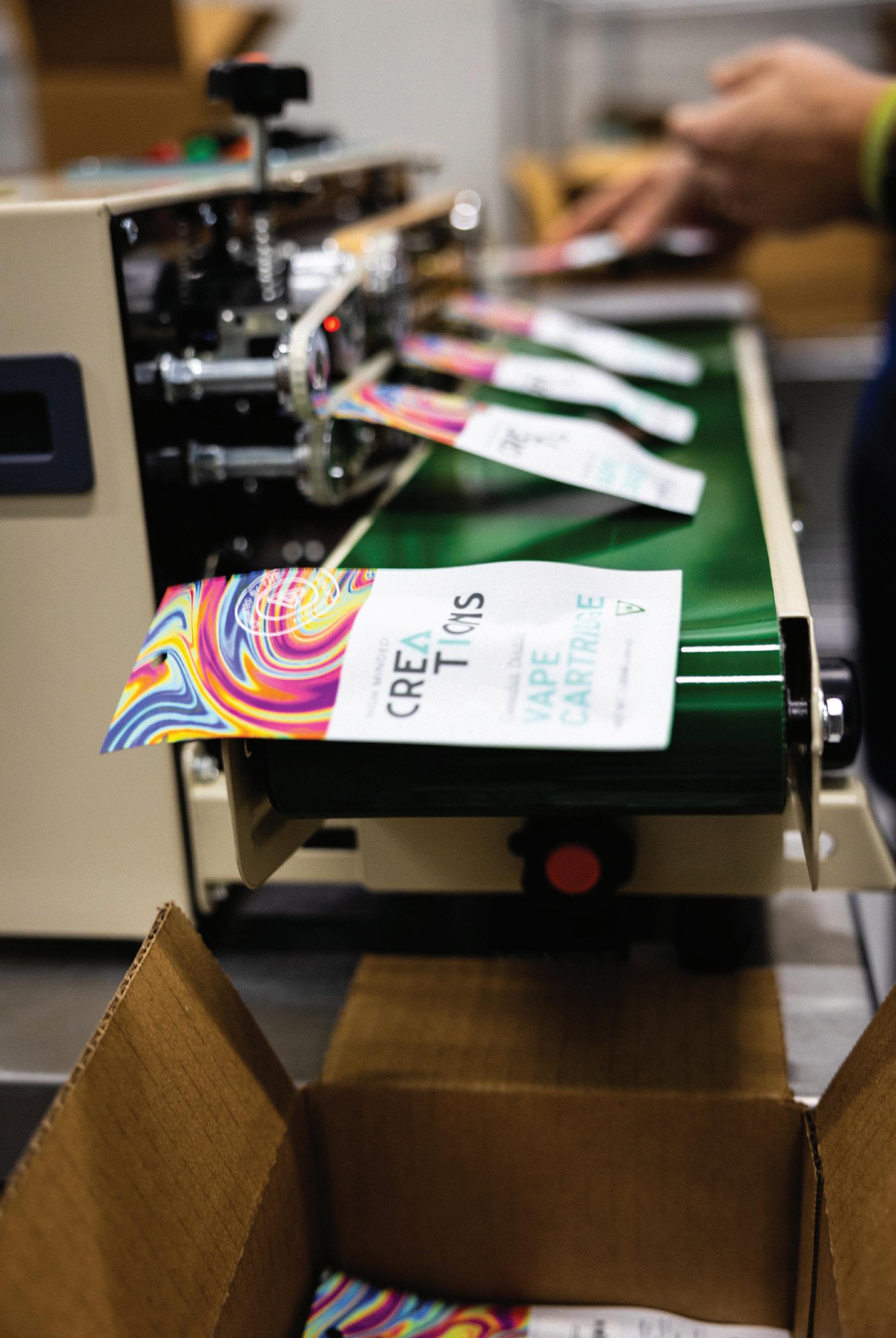
of survey respondents were either “very likely” or “somewhat likely” to close on an acquisition in the next year, while 34% said they were considering or were in the process of selling their business.
Wiley says the Stash Ventures team took its time to make sure the Cloud Cannabis culture meshed with its own and worked closely with Michigan’s Cannabis Regulatory Agency as well as municipalities to ensure a smooth transfer. She advises businesses considering a merger, acquisition, or sale to “move carefully.”
“There are many layers to this decision, so I recommend they do it diligently,” she says. “Get comfy with feeling a little uncomfortable through the process. It is unique, but it shouldn’t be scary. This can be really exciting, and you can design a transaction that works.”




It takes a generous amount of gusto to assume the title of entrepreneur, and that’s especially true of the folks who enter the cannabis industry.
In Detroit, the Homegrown Detroit program, administered by the city’s Office of Marijuana Ventures & Entrepreneurship, is helping to make the leap a little easier. At the MiCIA’s holiday gala this past December, Kim James, director of the OMVE, announced that Homegrown Detroit’s social equity fund would give out $100,000 in grants, and she
presented the first checks to recipients in attendance.
“We wanted to give out grants for a really long time, and so we developed this plan around November,” James says. Individuals who had already received cannabis licenses were eligible for up to $10,000, and aspiring licensees could apply for up to $3,000. The idea with the latter, James notes, was to reimburse applicants for pre-qualification costs.
In total, 24 grants were awarded. Most went to aspiring licens-
BY
“We’re hoping that people continue to make donations to the fund and then we can continue to give grants away every year.”
—Kim James, Detroit’s Office of Marijuana Ventures & Entrepreneurship

ees, and five $10,000 grants were given to fully licensed individuals. To qualify, grant recipients needed to have been part of the Detroit Legacy program. That certification is available for aspiring licensees who meet one of the following criteria: They’re residents who have lived in Detroit for 15 of the last 30 years, have lived in Detroit for 13 of the last 30 years and are low income, or have lived in Detroit for 10 of the last 30 years and have been convicted of a cannabis-related offense.
The MiCIA, which entered into a publicprivate partnership with the city of Detroit, serves as the fiduciary for the Homegrown fund. “We like having that partnership,” James says, “and I think they do, too, because they know it’s helping the cause of social equity and helping the city of Detroit.”




Abdullah Muhammad was one of the five $10,000 grant recipients; he and a few other awardees received their checks at the MiCIA holiday party. At the time of his interview with MiCIA Magazine in late March, Muhammad’s dispensary, Gage 313, was scheduled to open in May on Eight Mile.
After adult-use cannabis became legal in Michigan, a friend urged Muhammad to consider getting in on the ground floor of the industry in Detroit. At the time, Muhammad wasn’t particularly interested, but then he started researching other states’ markets, saw the potential, and began putting together a business plan. He got involved in the prep work as the city paved the way for its own adult-use ordinance, and he formed a consult-
ing company to help other aspiring licensees.
Muhammad admits that he has had to contend with his own relationship with cannabis. Growing up, his mom didn’t love that his dad was a smoker. He was too young to know what he was smelling, but when he would encounter that skunky scent, he knew an argument would soon follow. His parents ultimately divorced, but not before he’d developed a Pavlovian association between cannabis and tumult.
“It kind of triggered me,” he says. “When I’d smell it, it caused me to be kind of antsy, because I thought about my parents not being together.”
And when his brother, Muhsin Muhammad, was playing football for Michigan State and was arrested after police found a small


amount of cannabis in his car, it was Abdullah who picked him up from jail. The setback didn’t derail Muhsin’s career — he went on to play 14 years in the NFL — but seeing his older brother dressed in a jailhouse jumpsuit only further imprinted on Abdullah’s mind that cannabis was a negative, destructive thing.
Muhammad says he has never used cannabis and doesn’t think he ever will, but he’s since gained an appreciation for it. He’s learned about the body’s endocannabinoid system and the plant’s medicinal uses. He’s also learned about the campaign to make cannabis illegal in the first place in the early 20th century. “It was a business move by the paper industry because paper is so much cheaper to make from hemp plants,” he says, noting that “they lobbied … to criminalize anything that had to do with hemp or cannabis, because you can’t tell the difference between the two.”
“There’s always a story behind the story, right?”
As he was preparing to move into the operational space, Muhammad met with many of the big players in cannabis retail. Ultimately, he decided to partner with TerrAscend, operator of Gage, which has locations around Michigan, including one in Ferndale. He used part of the $10,000 Homegrown grant to renew his license with the city, and the rest has gone toward his new venture, which he wants to be Detroiter-heavy. Muhammad says his goal is to maintain both an employee and a customer base that are primarily Detroit residents. “I want to do what I can to get people a seat at the table,” he says, specifically “people who are passionate about it or who’ve been disproportionately impacted by the enforcement of cannabis.”
Najanava Harvey-Quinn was another recipient of one of the $10,000 Homegrown grants. As a longtime social equity advocate and the founder of the Clean Smoke Community


cannabis-related crimes. Her organization has been able to give out more than $100,000 to individuals getting out of prison, and it has put another $30,000-plus on the books for those still incarcerated. “That way,” she explains, “they don’t have to hustle while they’re in prison and they can just concentrate on their parole.”
Harvey-Quinn received a recreational license and opened a dispensary, but it unfortunately closed in February after she lost her business partners. “We hadn’t even made it a year yet, so that was really sad, and now we’re looking for new investors to bring in,” she says. “The license is still up and valid, so we will try to get some new investors, and hopefully we’ll be reopening soon.”
Like every entrepreneur, Harvey-Quinn is skilled in the art of the pivot, so, in the
meantime, she’s switching her focus to events. At the time of her interview with MiCIA Magazine, she was planning to apply for an events license and was hoping to start hosting affairs around town leading up to the ORI Reel International Film and Entertainment Festival (which she’s also behind) at Hart Plaza in September. She says she wants to craft experiences that aren’t always necessarily centered on cannabis but that are in a cannabis-friendly environment.
Harvey-Quinn shares Muhammad’s commitment to buoying Detroiters in the cannabis space. “We were seeing all these dispensaries popping up looking like Apple stores, and none of that money was really going back into the community,” she says of some provisioning centers operating in Detroit before the city had started licensing adult-use retailers.
“I felt like the Detroit Legacy piece was really important because when you are connected to a community, you’re more likely to care about the impact that you have on that community.”
—Najanava Harvey-Quinn, Homegrown Detroit grant recipient
“I felt like the Detroit Legacy piece was really important because when you are connected to a community, you’re more likely to care about the impact that you have on that community.”
The grant money given to Harvey-Quinn, Muhammad, and the 22 others is unrestricted, but the Office of Marijuana Ventures & Entrepreneurship requires that adult-use licensees in Detroit participate in the city’s Good Neighbor Plan. Licensees can choose from six adherences, including committing to maintaining a full-time staff of at least 50% Detroit residents for jobs paying at least $15 an hour, purchasing at least 50% of necessary goods and services from businesses located in Detroit, and donating annually at least 0.25% of annual gross sales to a Detroit-headquartered nonprofit or to the Homegrown fund.
James says donations to the Homegrown fund will help to finance future grants to support more Detroit-bred cannabis entrepreneurs. “We’re hoping that people continue to make donations to the fund and then we can continue to give grants away every year,” she says. Learn more at homegrowndetroit.org.

“I

love the work. It’s a lot more intense than I thought it would be. I feel I’m accomplishing a great deal, and since we’re at the infancy of the industry here in Michigan, I see a lot of growth for our company as well as other cannabis companies coming online right now.”
—Jason Wilson, Uncle J’s Joints

Uncle J’s Joints is thriving in Detroit and planning to expand
BY KATHY GIBBONSJason Wilson had been in the caregiver market for a few years when a 2017 trip to visit a friend in California opened his eyes to the true potential of growing cannabis.
There, his friend took him to a 4-acre greenhouse with more than 30,000 plants. “It was the most amazing thing I’ve ever seen in my life — acres and acres of marijuana plants lined up in rows,” Wilson says. “I was like, ‘This is incredible. I want one of these.’”
Now he has his own version. Wilson, a practicing attorney, is a co-owner and managing partner of Uncle J’s Joints, a family-owned, 30,000-square-foot grow facility in Detroit. With around 25 mostly full-time employees, the company is producing between 50 and 75 pounds of buds per week. It sells to some 20 processors and has its own branded flower or pre-rolls available in about 35 retail outlets.
FIRST
Wilson was moved to become a caregiver after a cannabis-growing friend in California told Wilson how his sister, who had cancer, had benefited from cannabis oil.
The more Wilson studied it, the more he was convinced. “When I was a young man, people thought cannabis was to get high off of,” says Wilson, 51. “It’s a medication.”
Not long after that California trip seven

years ago, he and some partners bought a cut-flower farm in California and converted it to grow cannabis. It was there that Wilson became adept at cultivating. “I learned it all,” he says. “I went to California for cannabis college.”
The team sold the California grow operation in 2021, and Wilson stopped commuting and settled back in Michigan full time. He owned the building where Uncle J’s is located now, but it had been vacant for several years after the state office that had been renting it left. He had hoped to lease or sell it but ended up deciding to seek approval to use it as a cannabis grow facility instead.
Wilson hired an expert in indoor cultivation facilities from Colorado to help him plan how the existing office building could be converted. It cost about $4.5 million to take it down to the studs and build it back out; equipment cost another $1.5 million or so.
Uncle J’s received three Class C licenses: two to grow for adult use and one for medical, though Wilson says the company isn’t using the medical license right now.
Wilson has been keeping busy. He’s cultivating his business and planning for expansion, and he was happy to coordinate with the MiCIA to host a group of legislators touring cannabis facilities; they came to learn about how various types of licensees operate.
A walk-through reveals pristine spaces for every aspect of the operation. In addition to 15 flower rooms — Uncle J’s is allowed up to 5,500 plants and currently has about 4,000 — there are three drying rooms, a nursery, and a pre-roll production space with automated machines that can produce up to 50,000 a week. There is also what Wilson describes as the “heartbeat of the facility”: the water room, which has an automated fertilization system that delivers just the right mix of nutrients to plants.
Uncle J’s philosophy is offering high-quality product at a reasonable price. “We do a lot of research on the strains that we grow, and we try to grow different strains than everyone else,” Wilson says.

Haider Bhatti, co-owner of Nirvana, which has multiple dispensaries in Michigan, buys flower and pre-rolls from Uncle J’s and says he appreciates the company’s business model.
“Uncle J’s is very competitive in the market on the prices and quality,” Bhatti says. “And it’s not only about the product but about them. They’re great to work with.”
Wilson has also impressed Kim James, director of Detroit’s Office of Marijuana Ventures & Entrepreneurship. “I love him to death because he’s been a role model for others,” she says. “He has a little more capacity, he’s a lawyer, he’s done all of this, he’s studied it. A lot of people go to him for mentoring and advice. His whole operation is so impressive.”
Uncle J’s got off to a good start, though Wilson says the market has changed over the last year and a half or so as prices have dipped.
“Things are starting to even out now because a lot of cities are coming online,” he says. “They’re starting to open more dispensaries, and the more dispensaries open up, the more product can get served to the general public.”
Wilson is hoping to expand into processing soon by adding on at the current site, and he also wants to establish a dispensary at another location in Detroit eventually. He’s eyeing other states for possible expansion as well. “We think we can become a national brand,” he says. “Our goal is to be in five states over the next 10 years.”
Wilson is still practicing law when he can, but he’s at Uncle J’s pretty much every day until it “can really take off and get a nice foothold.”
“I love the work,” he says. “It’s a lot more intense than I thought it would be. I feel I’m accomplishing a great deal, and since we’re at the infancy of the industry here in Michigan, I see a lot of growth for our company as well as other cannabis companies coming online right now.”
Security:
Business
Share
Free
ACH Services
Free
Business Specialists































The Michigan Cannabis Industry Association is the leading advocacy organization for Michigan’s legal cannabis industry.





We bring cannabis businesses together to speak as a unified voice promoting sensible laws and regulations, as well as industry best practices among members.
Join today! Visit micia.org or email us at info@micia.org.



















Green Stem’s compliance manager talks about the importance and challenges of following the state’s cannabis rules
By Emily Doran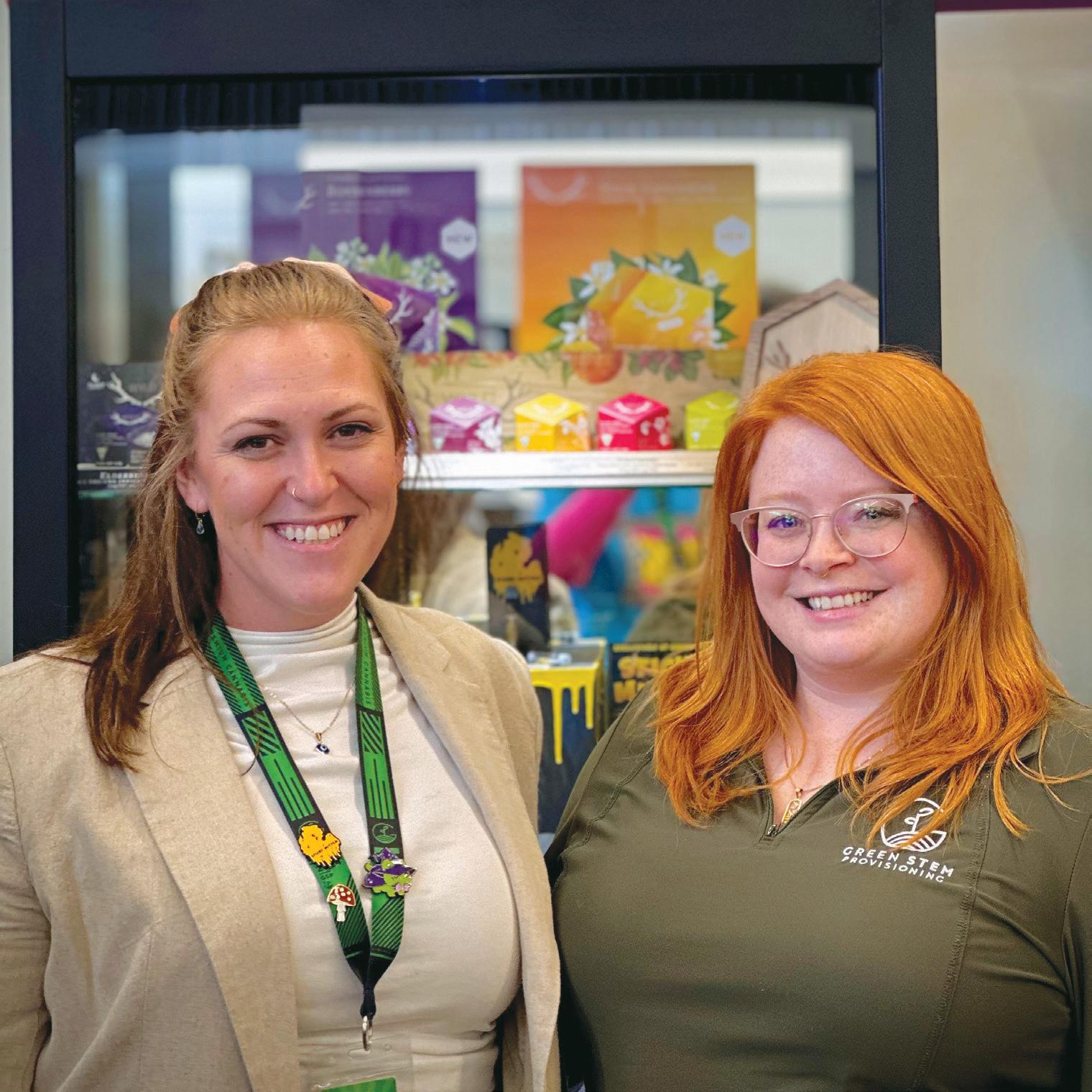
It’s hard to overstate the importance of compliance in the cannabis industry. Following the rules does more than protect businesses from penalties and fines; it also safeguards consumers’ well-being and the industry’s reputation.
Compliance can be a sticky topic, though, and adhering to the state’s rules is easier said than done. That’s why some cannabis companies create a dedicated full-time position for an employee to oversee an operation’s compliance.
Liz Ridgeway is that person at Niles-based Green Stem Provisioning. As the facilities compliance manager, she navigates the complicated, evolving regulations that form the
framework of the industry, and she keeps the business on track.
Compliance — and working with someone like Ridgeway who is in charge of overseeing it — has always been a priority at the family company.
“We didn’t have money to be noncompliant,” says Katie Lynch Lindgren, Green Stem’s brand director. “So we valued and invested into the role.”
MiCIA Magazine caught up with Ridgeway to learn about the duties of a compliance manager, the challenges she faces in her role, and the rules she would like to see change. This interview has been edited for length and clarity.
What do you do in your role as a compliance manager?
I wear a lot of hats, but usually it’s putting out issues or dealing with crises and then being on top of ensuring that we are staying compliant with the state. So a lot of what I do is answering questions from our employees about products that we receive, correspondence from vendors, ensuring all the products that we take into our facility are compliant, and ensuring everybody knows what that means — that it’s not just a thing that we talk about; it’s a thing that everyone has an active participation in. I do a lot of mock inspections and pretend to be the Cannabis Regulatory Agency and go through and inspect our processes to make sure that we’re doing the things that they’re looking for.
Why is it important for a cannabis company to have a compliance manager?
Compliance is really complicated. Even just today, I was dealing with an issue where one part of the rule is referenced, but if you don’t understand another part of it, the whole picture doesn’t come together. So you really need somebody who’s that subject matter expert and can have the legal mind to go in and review those laws and make that make sense for the business. It’s a fine line in between black-and-white compliance and what makes business sense. There are things that you absolutely cannot do, but there are a lot of business things that you can do, so having somebody who has an understanding and
can bring that to ownership or leadership and explain it in a way where it doesn’t sound so “legal-y” is really valuable.
What are some of the biggest compliance-related issues you deal with?
Products being transferred are some of the biggest things that we deal with, especially in the beginning. We had a really strict and robust compliance program at the beginning, and we approached it with an attitude of “We’re all in this together” and helping other vendors learn as we’re going. We did a lot of correspondence with the CRA and put together a new-vendor package to give to our new vendors that are doing business with us. That has the intake parameters that are pulled from the law, some of the things that are business standard practices, and things that we’ve learned that worked well over the years, like the way that you put Metrc tags on a box or the way that you’re packaging things, for example. If you package a joint in a bag and they’re all loose together, the quality’s going to go down, the customer isn’t going to have a good experience, and then it’s going to look bad on the vendor that in turn sent that to you. So having those best practices and then knowing what the laws are is something that’s really helpful, and we’ve made lots of good friends that way. We get a lot of praise from other people for helping them get through that. We like to be a resource.

Is there anything in the world of compliance right now that you would like to see change?
There are definitely many things we’d like to see change. Michigan is really stringent with, for example, aspergillus levels. Aspergillus is something that’s in the air all around. So that’s something that we’d like to see change.
Another thing I would like to see change: When you’re building a facility or you’re doing work on a facility, you have to be with those visitors at all times, and that’s a really big burden on a business, especially if there are only five people in a facility and that person has to be with an electrician the entire day. I’d like to see the CRA roll out some sort of program where qualified vendors are able to do work unsupervised. Everything’s under surveillance anyway.
Another thing I’d like to see be a little more robust is the CRA’s guidance on Good Manufacturing Practices. They lean a lot on the federal regulations for that, but there’s a lot of ambiguity in companies that you hire to do these certifications for you, and it’s a little bit of a gray area until you have an inspection by the CRA and the Department of Environment, Great Lakes, and Energy and they tell you, “You’re doing this, this, and this wrong,” or, “You’re doing this right.” It would benefit the industry as a whole to have that standard. There’s not something written in the rules that is telling you how to do these things. You have to have that compliance person or the lawyer to go in and understand




“It’s not the Wild West anymore; it’s becoming more regulated.”
—LizRidgeway, Green Stem Provisioning
the International Organization for Standardization regulations or the GMP regulations and decipher all that. So it does make it pretty challenging for a business to be successful. They can be successful for a long time — until they get an inspection, and then they’re fined because they weren’t doing something right that they didn’t know about.
Is there anything you wish other people in the industry knew about compliance?
It’s everybody’s job to be compliant, and understanding the seed-to-sale process and why these things are important, understanding how it can affect a consumer. For example, you have somebody who’s allergic to a dye, and they don’t put that on the ingredients list — that could be detrimental to somebody. And understanding that all of these little things come together to make a big picture. We’re able to do these jobs because of the regulation. It’s the world we live in. It’s not the Wild West anymore; it’s becoming more regulated. So I wish that people — and companies in general — would involve their employees more in that kind of thing. We take that approach of ensuring everybody understands what compliance is, training on Metrc tags and how that impacts their job, and what they need to do. It’s a partnership with everyone.
Is there anything else you’d like to add?
The CRA does a decent job of providing some tools out there. Metrc has some training things, and I would [recommend] doing the research yourself and talking to other people in the industry and having a partnership with people. I learn something new every day. I may read a rule this way today, and two weeks later, after I’ve learned something else, I realize, “Oh, actually, they meant this.” Don’t be afraid to ask questions. Government regulation can seem scary, but don’t be afraid to ask questions if you don’t understand what’s going on. And push back when you don’t think it’s right. We have an opportunity to advocate for ourselves — the CRA comes out and asks for feedback when they’re updating the rules. It’s really important that not just ownership but other people participate in those things, because if one person’s thinking it, somebody else is probably thinking it out there as well.

Growing Green will help you:
•Create a 5-8% higher valuation of your company
•Improve your strategic data
•Ease the management of your operations
•Save you money annually
•Put more cash in your pocket at tax time



TimothyMasterswasonlyfifteenwhenhestumbledacrossthemutilatedcorpse ofPeggyHettrickinafieldonhiswaytoschool.Almostassoonasthepoliceset eyesonhim,theyweresurehewasthekiller—evenwithnothingbutacollection ofgorydrawingshe’dcreatedasateenagehorrorfanasevidence. Fortenyearstheyhoundedhim,until—withthehelpofanastoundingamount ofmisconduct—theyfinallysucceededinputtinghimbehindbars. In DrawntoInjustice,Timrecountshisjourneytoexoneratehimselfforacrime hedidn’tcommitand,intheprocess,laysbarethecorruptionthatenabledthe criminaljusticesystemtorailroadaninnocentman.




























Timothy Masters was only fifteen when he stumbled across a mutilated corpse lying in a field. For ten years, the police hounded him until – with the help of an astounding amount of misconduct – they finally succeeded in putting him behind bars. Drawn to Injustice recounts his journey to exonerate himself for a crime he didn’t commit.
One-size-fits-all medical cannabis? Not when it comes to real people’s needs. For patients seeking relief through medical cannabis, navigating the vast array of strains and products can feel like going through an overwhelming maze. The sheer variety and volume of cannabis available can make it nearly impossible to find the specific product that actually helps a patient manage their condition. Imagine needing to relax only to end up feeling jittery from the wrong cannabis. Or worse, needing to gain weight and instead getting a variety of cannabis that suppresses your appetite!
Beyond the headline-grabbing THC content lies a hidden world of molecules called terpenes, which silently influence the plant’s aroma, flavor, and, potentially, therapeutic impact. Understanding the importance of terpene testing in medical cannabis requires venturing beyond marketing claims and into the exciting realm of the “entourage effect.”

lavender, lemons, and other plants, contribute significantly to plants’ unique scents and flavor profiles. But their role goes beyond aesthetics. Research suggests that terpenes interact with cannabinoids and other plant compounds, potentially modulating their effects and creating the so-called entourage effect.
Imagine an orchestra, if you will, with THC being the lead violinist. In this scenario, the terpenes are the entire ensemble, harmonizing and shaping the overall melody. Testing for terpenes helps patients and providers understand the full spectrum of potential therapeutic benefits they might experience. In addition, it may forewarn patients and consumers of the potential of having an allergic reaction to a specific strain.
BEYOND THC: THE SYMPHONY OF CANNABINOIDS AND TERPENES
The traditional focus on THC, the psychoactive component of cannabis, often overlooks the synergistic interplay between various plant compounds. Cannabinoids like THC and CBD interact with our body’s endocannabinoid system, impacting mood, pain perception, and various physiological processes. However, they don’t work alone.
Enter terpenes. These aromatic hydrocarbons, found not just in cannabis but also in
Many patients agree that the entourage effect provides better results in managing symptoms compared with a single cannabinoid.
While there is still great debate about the validity of the entourage effect, there are a few research studies that support the theory. The news release “Study Shows Cannabis Terpenes Provide Pain Relief, Contribute to ‘Entourage Effect’” (University of Arizona 2021) suggests that there is validity to the theory and that terpenes are a promising option for pain therapies and may lead to lower doses with fewer side effects. An early study, “The Case for the Entourage Effect and Conventional Breeding of Clinical Cannabis: No ‘Strain,’ No Gain,” also found evidence to support the synergistic pharmacological activities between terpenes and cannabinoids (Russo 2019). Many patients agree that the entourage effect provides
better results in managing symptoms compared with a single cannabinoid.
UNVEILING THE POTENTIAL: BENEFITS OF TERPENE TESTING
For patients using medical cannabis for specific conditions, understanding the terpene profile can offer valuable insights.
Certain terpenes exhibit specific pharmacological properties. For example, limonene, found in citrus fruits, is associated with mood-boosting effects, while linalool, present in lavender, possesses potential antianxiety properties. Knowing the terpene profile allows patients to choose strains aligned with their individual needs.
While THC content often dictates dosage, terpenes can influence the intensity and duration of effects. Myrcene, prevalent in many indica-dominant strains, is thought to contribute to relaxation and sleepiness, potentially influencing the optimal dosage for insomnia and/or pain management (Gobbo & Lopes 2003).
Some terpenes might mitigate unwanted THC side effects. A review in 2021 found that lavender exhibits potential anti-anxiety properties, potentially counteracting THC-induced anxiety (Weston-Green et al. 2021). By choosing strains rich in specific terpenes, patients might experience fewer adverse effects.
The key to unlocking the true potential of medical cannabis lies in understanding its chemistry: It’s not just about THC. Just like spices in a dish, terpenes work together with cannabinoids to create the final experience. Aligning the terpene profile with the desired therapeutic effect, patients might experience better management of their conditions. For example, researcher Ethan Russo discovered that strains high in caryophyllene, found in black pepper, might offer additional pain relief alongside THC (Russo 2011).
While terpenes are often hailed for their potential benefits, they can also be doubleedged swords. Like any plant-based product, some terpenes can trigger allergic reactions, ranging from mild skin tingles to serious breathing problems. Here’s a heads-up for those with preexisting sensitivities:
• A-Pinene: This common terpene, found in pine trees and many cannabis strains, can be a culprit for allergic reactions in people sensitive to evergreen oils and sap.
• Linalool: This calming terpene, also present in lavender, might not be so calming for those who have sensitivities to the flower. Be cautious with cannabis strains rich in linalool if you fall into this category.
• Terpinolene: If you experience negative reactions to mint plants or products, consider avoiding cannabis strains high in terpinolene, the terpene with a minty
aroma. Individuals with sensitivities to mint may also experience reactions to terpinolene.
In light of recent findings, as reported in a peer-reviewed article published in the Journal of Allergy and Clinical Immunology, it has become increasingly evident that individuals may experience allergic reactions triggered by cannabis consumption (Skypala et al. 2022). The article highlights that symptoms can vary in severity, posing potential health risks. Notably, the American Academy of Allergy, Asthma, and Immunology has elucidated through its research that allergic sensitization can occur not only through inhaling cannabis smoke but also via ingestion or skin contact. Such insights highlight the importance of thorough research and understanding the diverse effects of cannabis usage on individuals’ health.
Per the article “Characterization of Cannabis Sativa Allergens,” allergic reactions in patients who have severe allergies to some active ingredients of cannabis may manifest in various ways, including skin rashes, itching, swelling, respiratory

problems, and, in rare cases, anaphylaxis (Nayak et al. 2013). If you have a history of allergies, it is essential to know your allergies and be cautious while using products containing terpenes. It’s advisable to consult with a health care professional if you are unsure about using products containing terpenes.
Terpene testing can help reduce risks in several ways. Firstly, by identifying the terpene profile of a particular strain, it’s possible to avoid those that contain terpenes you might be allergic to. This can help prevent allergic reactions and other negative side effects. Secondly, provisioning centers that provide detailed terpene testing reports promote transparency, which empowers users to make informed decisions about their treatment. This information can be especially helpful for people who are new to cannabis, have allergies, or are looking for relief from specific symptoms.
It’s important to understand that medical cannabis is not a one-size-fits-all solution. There are countless variations of cannabinoids and terpenes, each with unique

Gobbo-Neto, L., & Lopes, N. P. (2003). Central effects of citral, myrcene and limonene, constituents of essential oil chemotypes from Lippia alba (Mill.) NE Brown. Phytomedicine, 9(8), 709–714. DOI: 10.1078/094471102321621304
Nayak, A. P., Green, B. J., Sussman, G., Berlin, N., Lata, H., ElSohly, M. A., Hettick, J. M., & Beezhold, D. H. (2013). Characterization of Cannabis sativa allergens. Annals of Allergy, Asthma & Immunology, 111(1). DOI: https://doi.org/10.1016/j.anai.2013.04.018
Russo, E. B. (2011). Taming THC: Potential cannabis synergy and phytocannabinoid-terpenoid entourage effects. British Journal of Pharmacology, 163(7), 1344–1364. DOI: https://doi.org/10.1111/ j.1476-5381.2011.01238.x
Russo, E. B. (2019). The Case for the Entourage Effect and Conventional Breeding of Clinical Cannabis: No “Strain,” No Gain. Front. Plant Sci. 9:1969. DOI: 10.3389/fpls.2018.01969
properties that interact with the human body differently. By acknowledging the complex interplay between these compounds, we can unlock the full potential of this plant medicine and empower patients to navigate their path to wellness with greater clarity and confidence.
Cathleen S. Graham, BSN, RN, CHPN, is the founder and CEO of cannabisnurse. com and a member of the MiCIA’s Scientific Committee. She provides holistic education and consulting, specializing in cannabinoid support. She has 25 years of experience as a registered nurse and is an internationally respected speaker, an educator, and a leader in the field of end-of-life care. She has cared for thousands of patients whose life journeys were positively affected by cannabis. Graham is also the first and only nurse to receive the Americans for Safe Access’s Medical Professional of the Year award in 2019.
Skypala, I. J., Jeimy, S., Brucker, H., Nayak, A. P., Decuyper, I. I., Bernstein, J. A., Connors, L., Kanani, A., Klimek, L., Lo, S. C. R., Murphy, K. R., Nanda, A., Poole, J. A., Walusiak-Skorupa, J., Sussman, G., Zeiger, J. S., Goodman, R. E., Ellis, A. K., Silvers, W. S., & Ebo, D. G. (2022). Cannabis-related allergies: An international overview and consensus recommendations. Allergy, 77(7), 2038–2052. DOI: https://doi. org/10.1111/all.15237
The University of Arizona Health Sciences (2021). Study Shows Cannabis Terpenes Provide Pain Relief, Contribute to “Entourage Effect.” University of Arizona Health Sciences News Releases. Retrieved from https://healthsciences.arizona.edu/news/releases/study-showscannabis-terpenes-provide-pain-relief-contribute-entourage-effect
Weston-Green, K., Clunas, H., & Jimenez Naranjo, C. (2021). A Review of the Potential Use of Pinene and Linalool as Terpene-Based Medicines for Brain Health: Discovering Novel Therapeutics in the Flavours and Fragrances of Cannabis. Frontiers in Psychiatry, 12, Article 583211. DOI: https://doi.org/10.3389/fpsyt.2021.583211
Michigan cannabis licensees are facing financial challenges. Here’s what’s next.
By Patrick DunnWhen asked about the current financial state of Michigan’s cannabis industry, Grosse Pointe Farms–based cannabis lawyer Paul Tylenda pulls no punches.
“There’s a failure of expectations,” he says. “Dreams turned to nightmares, that kind of stuff.”
Kaleb Grapp, a certified public accountant specializing in cannabis, is less drastic in his assessment but still concerned.
“Top-line total sales have consistently grown, it seems like every month,” says Grapp, founding partner at the Saginaw-

based CPA firm Grapp Lerash. “But generally,” he adds, “I guess I would say it’s probably strained.”
Despite more than $3 billion in total sales last year — a roughly 33% increase from 2022 — Michigan’s cannabis industry has experienced a rocky ride. Falling prices, problems with enforcement and nonpayment, and even broader issues such as inflation have arguably played a part in creating the current climate. We checked in with several experts to get their insights on the current financial state of the industry and where things might be headed next.
Perhaps the most notable challenge for Michigan retailers has been a steep decline in prices. The average retail price of adultuse flower has plummeted from $516.21 per ounce in December 2019 to $86.61 per ounce in April 2024.
Tim Adams, principal and leader of the cannabis services team at Lansing- and Grand Rapids–based accounting firm Maner Costerisan, says supply has outstripped demand.
“Having to weather that storm was the hard part, and it was probably going to come,” he says. “It’s just nobody knew exactly when there could be that market saturation.”
Prices stabilized somewhat last year — the average retail price of adult-use flower rose modestly overall, from $80.16 per ounce in January to $95.08 in December — but they were trending downward from October 2023 to April 2024, from $97.62 to $86.61. Still, the fluctuations in 2023 and early 2024 have been less dramatic than in 2022.
“By having some predictability or stability in pricing, companies know what they need to do to start generating a profit or make those steps to generate a profit,” says Chris Rosmarin, principal and leader of the cannabis practice at Rehmann, a multistate professional advisory firm with 10 Michigan offices.
Unfortunately, the industry is still feeling the long-term effects of falling prices, as many cash-strapped retailers have failed to pay their suppliers. Tylenda, whose practice deals with collections, says the situation involves not just a “few bad actors” but a broader “economic reality.”
“We all prioritize our bills,” he says. “If I have $900 in my pocket, and I have $1,000 worth of bills, I’ve got choices to make.”
Tylenda says growers are usually hit the hardest in those scenarios because they still have product to move, and the legal cost of recovering what they’re owed isn’t always worth it. But retailers feel the repercussions as well, and some Michigan licensees have entered receivership over unpaid debts. Grapp notes that many licensees who entered the adult-use industry early are also still struggling with the debt burden of premium startup costs. He predicts that more licensees will enter
“The good businesses, the ones that have the capital, that are keeping good books and records, that are really focused on compliance, are going to be the ones that are going to ultimately succeed and thrive in this state.”
—Chris Rosmarin, Rehmann
receivership this year and next.
“This is probably a normal thing,” he says.
To resolve the situation, Tylenda thinks the state should require clean books as a condition of license renewals or require cash on delivery for wholesale cannabis purchases.

changes to AFS deadlines have been a source of confusion for some licensees. The CRA’s disciplinary action reports for January through April indicate fines imposed for 17 instances of AFS noncompliance this year so far.

“The answer is the regulators, because it’s the regulation that is supposed to keep the playing field even,” he says.


Many in the Michigan cannabis industry have also noted an increase in enforcement by the Cannabis Regulatory Agency, with mixed results for licensees.
Rosmarin says he believes CRA enforcement has “played a big role in price stabilization.”
“I just don’t hear as many complaints as I did a couple of years ago about the bad actors, although I’m sure there’s still some of that out-of-state weed coming in,” he says. “That was influencing pricing.”
However, some licensees are struggling to keep up with CRA requirements for their annual financial statements. Adams says he has “absolutely” observed more licensees receiving notices of deficiency, which may indicate items on an AFS that require further clarification. Tylenda says
The fines are “enough to get your attention,” Tylenda says. “They aren’t necessarily enough to break you, depending on your current financial conditions.”
Still, Rosmarin says CRA compliance will likely be a strong indicator of licensees’ long-term sustainability.
“The good businesses, the ones that have the capital, that are keeping good books and records, that are really focused on compliance, are going to be the ones that are going to ultimately succeed and thrive in this state,” he says.
The pending federal rescheduling of cannabis from a Schedule I drug to a Schedule III drug is another issue that will likely have wide-ranging financial effects on the industry. Under the change, Michigan’s cannabis operators would no longer be subject to the IRS’s Section 280E tax code, which forbids deduction of business expenses for those trafficking Schedule I or II drugs. Rosmarin says that shift would represent “a huge number that will go right in the pockets of the investors once that occurs.”
Rescheduling is also likely to bring challenges for existing operators. “It will allow


the big boys to do bigger things,” Tylenda says. Similarly, Adams predicts that competition — particularly from out-of-state operators — will increase with rescheduling. But overall, he says, it will “level the playing field” for the industry as a whole, allowing it to function more normally.
“I don’t think it’s just going to be an overnight fix or anything,” he says. “But I think in the long run, it will be great for the industry, because then they can operate like other businesses do and compete accordingly.”
in 2023? Tylenda says lower prices have helped to drive revenue growth, and he anticipates that trend will continue.
“The pricing structure is making cannabis more available,” he says. “It’s making it less of a payday purchase and more of an affordable item.”

So will industry revenue see huge growth again in 2024 as it did

The other experts we chatted with predicted much more modest growth this year. Grapp says he anticipates his oneword description of the industry — “strained” — will be the “song and dance for 2023, 2024, and probably a little bit of 2025.” Rosmarin says he’s observed many of his clients “growing up” and “evolving from entrepreneurs
“There’s a failure of expectations. Dreams turned to nightmares, that kind of stuff.”
—Attorney Paul Tylenda on the current financial state of the Michigan cannabis industry
to business owners,” and he expects that kind of increased discipline will be key to surviving the industry’s current financial challenges.
Grapp agrees: “Now more than ever is the time when operators need to focus on the quality of their product and the trust they build with their consumers.”
Michigan’s
cannabis businesses may soon find it easier and more profitable to offer multi-strain products if the CRA changes its tagging rulesBy Lauren Wethington
Like many cannabis consumers, Perry Kountouriotis likes variety. He prefers buzzier sativa strains during the day and calming indica strains in the evening hours, meaning he often found himself bringing multiple vape cartridges with him when he headed out of town. He thought he’d solved his own problem when Rooted and Zooted, the cannabis brand he co-founded in 2022, developed a unique flagship product: a dual-strain vape cartridge.
“Our vape cartridges have two sides,” Kountouriotis explains. “Take our 2-gram cartridge, for example: One side is indica; the other side is sativa. And it has a button, which you can switch from one side to the other. You can also put the button in the middle, and it’s basically a hybrid; you smoke both flavors at the same time.”
Kountouriotis and his team hit a roadblock, though: The Michigan Cannabis Regulatory Agency requires every individual cannabis strain to be logged and tracked separately, meaning goods containing multiple strains must be labeled and processed as multiple individual products. That may soon change, thanks to feedback from Kountouriotis and others about how the rule has negatively impacted business prospects.
The CRA requires cannabis businesses to use a system called Metrc to track cannabis inventory in the state. This is done using serialized tags that, when scanned, reveal the product’s journey from the grow to the retail store.
Products containing more than one strain must have a tag for each strain. At the point of sale, the vendor must ensure
“We testified to the CRA why this product-tagging rule change is so important for the industry. We really fought for this change.”
—Perry Kountouriotis, Rooted and Zooted


that each individual tag is scanned and entered as its own sale in the Metrc system — an irksome process for dispensary staff.
“I have to go and explain to vendors, to dispensaries, that you have to scan two codes in order to sell our product,” Kountouriotis says. “A lot of dispensaries will basically just flat out turn us down. They’ll say, ‘We’re not doing that, because it’s too much work.’”
The system is also expensive. Each Metrc package tag costs 25 cents. Additionally, each strain in a product must be tested individually, so testing dual-strain products costs more than testing singlestrain products.
But Kountouriotis contends this isn’t necessary for consumer safety, which he notes is the CRA’s “No. 1 concern” — it is possible for labs to test the combined product once as a whole.
“Because it is two products, but you can smoke both at the same time, we’re going to be able to take both of those products for testing purposes,” he says. “All they
do is combine that, and then they test the combination of the two products.”
Proponents of the change also believe it will spur innovation and keep Michigan’s cannabis industry on the top of the heap in a potential national marketplace.
“What I look at is, How’s Michigan going to do when the walls come down? When all the states are legal, and we can ship to other states, we want to be innovators,” says Ryan Basore, CEO of Redemption Cannabis. “Everyone in this area wants that — the CRA wants that, of course, and the businesses. This is just a technical problem.”
Basore says Redemption would like to offer customers multi-strain products, but the existing requirements have precluded the development of them.
“We’re hamstrung for, really, no good reason,” he says.
The demand for these products is there, Kountouriotis notes — “People want variety, … and that’s why they love our pens so much” — so he and the MiCIA pushed for a change.
“We went to the CRA, we met with Director Hanna, we’ve been to the meetings,” he says. “We testified why this is so important for the industry. … We really fought for this change.”
A shift has already started. At a public CRA meeting on March 14, Executive Director Brian Hanna indicated that the CRA’s next updated rule set would clarify that multipacks of edibles would only require one Metrc tag per package.
“It’s just good business and good marketing,” Basore says. “I don't see a downside for anybody.”


A partner in Plunkett Cooney’s Bloomfield Hills office, Jeffrey M. Schroder is the firm’s expert on cannabis law and all aspects of state and local regulatory compliance.
the suburbs, many communities have embraced the retailers and are receiving their share of the revenue stream. For example, Center Line (population 8,500) in Macomb County is receiving nearly $600,000.
1. WHAT CHANGES ARE ON THE HORIZON FOR CANNABIS LEGISLATION?
For 15 years, important cannabis legislation has been enacted at the state level, but it is time to watch federal legislation closely. Pending legislation to provide a safe harbor for banking institutions to service the cannabis industry was advanced out of the Senate banking committee and is now awaiting action on the Senate floor. Known as the Secure and Fair Enforcement Regulation (SAFER) Banking Act, it may be considered later this year. Also, the Drug Enforcement Administration is prepared to reclassify cannabis from a Schedule I to a Schedule III drug. This historic change in drug policy is likely to occur sometime in 2024 and would have a far-reaching impact that could affect funding for scientific research and criminal justice reforms.
2. ARE THERE DIFFERENCES IN HOW COMMUNITIES HAVE EMBRACED THE INDUSTRY?
The city of Detroit fully embraced the cannabis industry and took bold efforts to implement a social equity program to ensure underrepresented populations are owners and operators. The city will receive nearly $2 million in cannabis revenue sharing for its share of the 10% excise tax that was levied in fiscal year 2023 at cannabis retailers. In
3. HOW HAS THE CANNABIS INDUSTRY AFFECTED THE ATMOSPHERE AND INCOME OF THESE MUNICIPALITIES?
Some communities have “opted out” of cannabis because the city leaders have adopted an ordinance or resolution against allowing licenses or the voters have turned down ballot proposals. As for the atmosphere, it does not appear that cannabis facilities significantly increase crime, but in some communities with marijuana cultivation operations, there are periodic complaints about the smell from the facility.
4. HOW HAS YOUR WORK WITH MUNICIPALITIES REGARDING CANNABIS LAW CHANGED OVER THE YEARS?
I have worked on cannabis legal, regulatory, and zoning issues, as well as drafted ordinances and advised communities on the possible benefits or drawbacks of allowing cannabis facilities. I have also represented cannabis businesses in cities, townships, and villages where the operators seek to be licensed. The current issue for many communities remains the decision of whether to “opt in.” A majority of municipalities have “opted out,” but the 2018 law adopted by the voters in Michigan permits advocates to obtain petition signatures and force a ballot proposal in any
municipality on the “opt in” question. I look for more ballot proposals in November 2024, when a high voter turnout is expected for the presidential election.
5. WHEN A CANNABIS BUSINESS OR MUNICIPALITY IS LOOKING FOR LEGAL SERVICES, WHAT IS MOST IMPORTANT TO KEEP IN MIND?
They need their attorney to have a business and corporate law background to protect their interests in a very tough regulatory environment. An attorney needs to navigate the complex state and local regulations that apply to the business. Several communities have been plagued with lengthy and expensive cannabis litigation from applicants denied a local license. Any municipality that wants to enter this space needs a strategy to prevent litigation because lawsuits can drain time and resources from municipal officials who are facing so many other challenges.
JEFFREY M. SCHRODER, PARTNER
Business leaders in the cannabis industry say they trust the attorneys of Plunkett Cooney to help them secure and renew licenses, anticipate legal pitfalls and win in court. Grow your cannabis business with confidence. Get the Plunkett Cooney perspective.
n Business Transactions & Planning n Cannabis Law n Commercial Litigation
n Employment Law n Environmental & Energy Law n Government Relations
n License Applications & Renewals n Mergers & Acquisitions n Real Estate Transactions
n Regulatory Compliance n Trust & Estate Planning n Tax Law
ATTORNEYS & COUNSELORS ORNEYS AT LAW
J Jeffreffrey M. Sc y Schroder
Direct: (248) 594-2796
jschroder@plunkettcooney.com
1. IN WHAT WAYS CAN OUTSOURCED ACCOUNTING SERVICES BENEFIT CANNABIS BUSINESSES COMPARED TO MANAGING ACCOUNTING INTERNALLY?

A trusted advisor specializing in cannabis advisory, tax, and accounting solutions, including license application consulting, entity selection, and access to capital assistance, Alex Wilson helps cannabis leaders grow their operations.
regulations, optimizing deductions, and ensuring compliance with evolving legal standards. By leveraging lessons from such cases, businesses can proactively address compliance challenges, mitigate risks associated with tax uncertainties, and develop robust financial management practices that align with regulatory expectations in Michigan’s dynamic cannabis sector.
Outsourced accounting services offer numerous advantages for cannabis businesses compared to internal management, including access to specialized expertise, enhanced compliance support, and strategic financial guidance tailored to the industry’s unique needs. By partnering with external accounting professionals familiar with Michigan’s regulatory framework and industry nuances, cannabis businesses can streamline financial operations, improve accuracy in reporting, and gain valuable insights for informed decision-making. Outsourcing accounting functions not only increases operational efficiency but also mitigates risks associated with complex tax laws and ensures financial stability amid the evolving landscape of Michigan’s cannabis market.
2. HOW CAN LANDMARK TAX COURT CASES SHAPE FINANCIAL STRATEGIES AND COMPLIANCE FRAMEWORKS FOR BUSINESSES AMID REGULATORY UNCERTAINTIES?
Landmark tax court cases provide valuable insights into legal precedents, interpretations of tax laws, and potential implications for financial strategies within Michigan’s cannabis industry. Analyzing cases offers guidance on navigating complex tax
3. HOW DO YOU NAVIGATE THE INTRICATE TAX IMPLICATIONS OF 280E, CONSIDERING RECENT IRS AUDITS AND EVOLVING INTERPRETATIONS?
Managing the tax complexities of Internal Revenue Code Section 280E demands a deep understanding of recent IRS audit trends, evolving legal interpretations, and strategic tax planning. With audits scrutinizing deductions and compliance more closely, businesses must stay abreast of changing regulations to optimize deductions within the confines of 280E. Expert guidance is essential to navigate this challenging landscape, ensuring accurate reporting, minimizing tax liabilities, and safeguarding financial stability in an environment where regulatory scrutiny is intensifying.
4. WHAT STRATEGIC CONSIDERATIONS SHOULD CANNABIS BUSINESSES EVALUATE WHEN CONSIDERING SHIFTING TO A C CORPORATION STRUCTURE AMID CHANGING TAX LAWS AND INDUSTRY DYNAMICS?
Transitioning to a C corporation requires careful evaluation of factors like double taxation risks, potential tax benefits, and operational implications within Michigan’s evolving cannabis industry.
Assessing the strategic impact involves analyzing tax advantages, compliance requirements, and long-term financial goals to determine whether the shift aligns with the business’s objectives. Expert advice is crucial to navigate the complexities of this structural change effectively, ensuring that the transition enhances financial efficiency, optimizes tax planning strategies, and positions the business for sustainable growth in Michigan’s competitive cannabis market.
5. WHAT APPROACH DOES YEO & YEO TAKE TO ADVISING CLIENTS?
First and foremost, we are our clients’ business success partners. We work with them to build customized, rightsized relationships that help our clients remain compliant, organized, and growing. Our clients’ goals vary, but whatever their goals are — vertical integration, preparing for mergers and acquisitions, adding licenses, or opening a new location — we ensure they have the information they need to make data-driven decisions, and we are there to support them every step of the way.









Strict regulations. Tax implications. Security procedures. Surging competition. It all requires a trusted partner with wide capabilities and a personal, customized approach. Our Cannabis Services Group brings a wealth of experience in cannabis, agribusiness, manufacturing and retail, making us uniquely qualified to help you navigate the complexities. Let us help you thrive.

As co-founder and CEO of the Birmingham-based Future Grow Solutions/Leaf & Bud, Mark Savaya has spent 16 years cultivating an ambitious and enterprising cannabis growth and retail business.
1. HOW DID THE IDEA FOR LEAF & BUD COME ABOUT?
Leaf & Bud Provisioning Center was an outgrowth of Future Grow Solutions — a way to sell what we produce in our Detroit and Center Line facilities. We have ve retail Leaf & Bud centers o ering both medical and recreational cannabis. It has been an incredible journey to bring Leaf & Bud to the Detroit community.
2. YOU HAVE YOUR OWN BRAND-LABEL CANNABIS. HOW DID THAT COME ABOUT?
The Mark Savaya Collection is only available at Leaf & Bud. It is a strain that I bred myself, and I am very proud to o er this special product at our locations. Our Leaf & Bud brand uses only premium nutrients. We handcraft all our own batches of edibles, concentrates, topicals, oils, and additional products. We also o er premier products from some of the biggest names in the bud business. I also like to think I have put a lot of thought into the buying experience. Our locations are sleek, inviting, state-of-the-art, and futuristic in design. Our cannabis consultants are knowledgeable about our products and take time to understand customer needs and requests — whether medical or recreational.
3. HOW HAS YOUR RETAIL BUSINESS EXPANDED?
With our Detroit and Center Line locations rmly established, we are moving into Leaf & Bud locations in Lenox Township, Monroe, Hazel Park, and Battle Creek. I recently purchased the former Sanders Confectionery factory in Highland Park on Oakman and am remodeling it for a new Leaf & Bud location. We are waiting on city approval to move forward with these plans, which will be a great opportunity to hire hundreds of local quali ed individuals. I like to feel that I am reinvesting in communities and bringing buildings that have been vacant for a long time back to life. We are looking at having 14 locations soon.
4. IN ADDITION TO THE RETAIL BUSINESS, HOW HAVE YOU CHANGED THE CANNABIS GROWING PROCESS?
Future Grow Solutions, the parent of Leaf & Bud, has revolutionized the way cannabis is grown and harvested. Our indoor grow facilities are state-of-the-art and allow us to produce more than 50 di erent strains indoors using soil organic growth. This method produces high-yield crops to meet consumer demand. We specialize in exotic, quality products. The technology that we are employing is truly state-of-the-art, economical,
and environmentally friendly. Our computer management systems monitor and manage every key aspect of our grow rooms to ensure optimum outcomes.
5. WHAT KEEPS YOU MOTIVATED?
For me, it’s not work if you love what you do. I get very excited when I can help growers and investors in all that is involved with the cannabis business, including securing real estate, nding nances, establishing a reliable security system, ensuring compliance, and helping to recruit the right talent. In addition to overseeing the daily operation of training and support of the grow operations, I am able to grow my business close to home by opening more Leaf & Bud locations and selling our quality products.
MARK SAVAYA, CEO


Assembling a hardworking team, Lovely Ladies Who Trim co-founders Brittany and Lynn Brewer have built up a clientele of more than 500 and are well renowned for their trimming and packaging expertise.
combined, and each member brings a wealth of knowledge of the postharvest process.
1. WHAT IS A TYPICAL DAY LIKE FOR THE LOVELY LADIES WHO TRIM?
Our crew sets off before 8 a.m. and typically carpools to one of our clients in the metro Detroit, Ann Arbor, Lansing, or Flint area. We currently have close to 50 crew members, and it can be a long day. The growers provide lunch to all trimmers, and for security purposes, the trimmers take an hour break for lunch. We always meet with a client first to establish expectations in terms of workload and productivity.
2. WHAT INTERESTED YOU IN ESTABLISHING THIS BUSINESS?
We moved from Florida to Michigan when we could see that the laws to legalize cannabis were moving faster here. Our interest came from a more personal level, as a family member of ours suffered from cancer and died several years ago. We really feel that cannabis could have helped relieve some of his pain, if only it had been an option. After researching the medical benefits and opportunities for growth in this field, we decided to take a chance and start Lovely Ladies Who Trim. Today, our assembled team has more than 50 years of experience in this industry
3. WHEN DID YOU RECOGNIZE THAT THE CANNABIS INDUSTRY WAS GOING TO NEED YOUR SERVICES, AND HOW DID YOU SEE THESE OPPORTUNITIES EARLY ON?
Once cannabis was legalized in Michigan, there were many growers ready to go on a large scale, but with growth comes the need to trim and tend. We provide a variety of services, including dry trimming, wet trimming, packaging, and de-leafing — everything postharvest — and we even do transplanting for some of our clients. Maintaining the product during its growth is essential and if not done properly can lead to damage. We knew that this would be well handled by a crew that could come in at intervals, and that is how we operate today.
4. HOW DO YOUR CLIENTS FIND YOU?
Our clients are referred from other customers, and we have a big presence on Google, Instagram, and Facebook. Clients know us now by our reputation of being a dedicated team that works for 10 hours at a time and has a good time while we are there. We just put on music and trim and talk about anything and everything. We are truly a close-knit group.
5. WHAT ELSE WOULD YOU LIKE PEOPLE IN THE MICIA TO KNOW ABOUT LOVELY LADIES WHO TRIM?
That we are a dedicated team of cannabis trimmers, and since 2018, we have been known for our expertise in hand-trimming and packaging cannabis to perfection, ensuring optimal potency, flavor, and visual appeal. We combine artistry with precision, creating a meticulous trimming process that results in top-tier cannabis products. We prioritize quality and sustainability and advocate for responsible cultivating methods. Also, we are fast. We find, on average, that our crew is 40% to 100% faster than any process currently in place, which translates to more pounds per day in production. Our clients know that we are fierce, fast, and extremely knowledgeable about cannabis cultivation.






































The premier networking event for the cannabis industry is back! Join us from Wednesday, Aug. 7, to Friday, Aug. 9, at the Shanty Creek Resort in Bellaire for the MiCIA’s sixth Summer Annual Conference and Chronic Cup Championship.

START Wednesday, Aug. 7
FINISH Friday, Aug. 9
LOCATION
Shanty Creek Resort 5780 Shanty Creek Road
Bellaire, MI 49615
For ticket information, email the MiCIA team at info@micia.org.

BY






